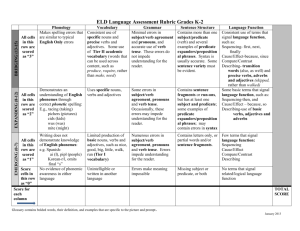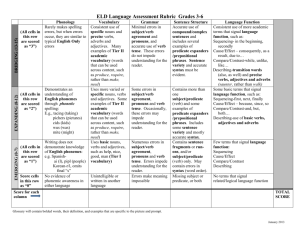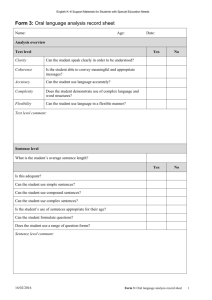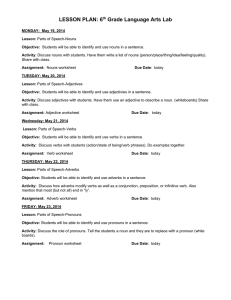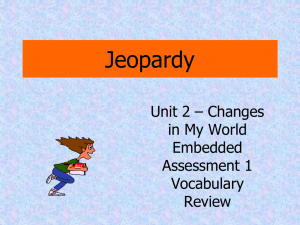Sentences - About Coach Sides
advertisement
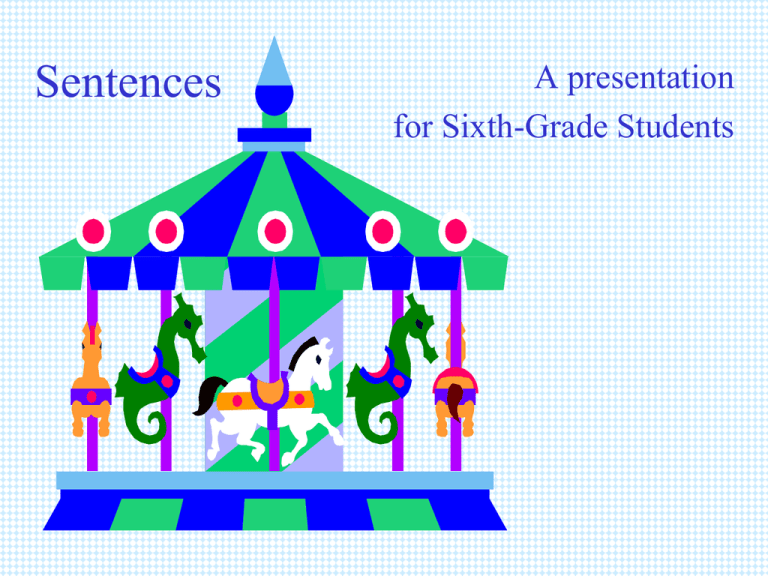
Sentences A presentation for Sixth-Grade Students A sentence is a group of words that expresses a complete thought. Every year we go to the fair. A sentence must have both a subject and a predicate. My friend won a stuffed tiger at the fair. A sentence will begin with a capital letter. The roller coaster is my favorite ride. A sentence will end with a punctuation mark. The roller coaster is my favorite ride. A sentence fragment is just part of a sentence. (Something is missing.) While riding a Ferris Wheel. A run-on is a sentence composed of two or more complete thoughts joined together without correct punctuation. (It contains too much.) My sister got to the top of the Ferris Wheel she screamed as loudly as she could she rode without holding on. There are four kinds of sentences. • Declarative makes a statement of fact or opinion ends with a period Children love to ride the rides. There are four kinds of sentences. • Imperative gives a command or request ends with a period Be careful on the bumper cars. There are four kinds of sentences. • Interrogative asks a question ends with a question mark Have you ever won a blue ribbon at the fair? There are four kinds of sentences. • Exclamatory shows strong feeling or emotion ends with an exclamation mark Help! This roller coaster is out of control! There are two main parts to any sentence. a. The SUBJECT tells what the sentence is about. i. Subjects are always nouns or pronouns. Robin loves foot-long hot dogs. She eats one every year at the fair. There are two main parts to any sentence. a. The SUBJECT tells what the sentence is about. i. ii. Subjects are always nouns or pronouns. Nouns are words that name a person, place, thing, or idea. person place thing idea Robin fair hot dog love There are two main parts to any sentence. a. The SUBJECT tells what the sentence is about. i. ii. iii. Subjects are always nouns or pronouns. Nouns are words that name a person, place, thing, or idea. Pronouns are words that can take the place of nouns. person place thing idea Robin (she) fair (there) hot dog love (it) (it) There are two main parts to any sentence. a. The SUBJECT tells what the sentence is about. i. ii. iii. iv. Subjects are always nouns or pronouns. Nouns are words that name a person, place, thing, or idea. Pronouns are words that can take the place of nouns. The complete subject includes a noun or pronoun and all the words that describe it. My youngest sister Paula loves to look at the antiques on display. There are two main parts to any sentence. a. The SUBJECT tells what the sentence is about. i. ii. iii. iv. v. Subjects are always nouns or pronouns. Nouns are words that name a person, place, thing, or idea. Pronouns are words that can take the place of nouns. The complete subject includes a noun or pronoun and all the words that describe it. The simple subject is the key word or words in the complete subject. My youngest sister Paula loves to look at the antiques on display. There are two main parts to any sentence. a. The PREDICATE tells what the subject is or does. i. A predicate is always a verb. The clown entertains us with his jokes. There are two main parts to any sentence. a. The PREDICATE tells what the subject is or does. i. ii. A predicate is always a verb. A verb expresses action or being. The clown entertains us with his jokes. He is extremely funny. There are two main parts to any sentence. a. The PREDICATE tells what the subject is or does. i. ii. iii. A predicate is always a verb. A verb expresses action or being. There are two kinds of action verbs—physical action (run, jump, etc.) and mental action (think, dream, etc.). The clown balances on the ball. He imagines himself on solid ground. There are two main parts to any sentence. a. The PREDICATE tells what the subject is or does. i. ii. iii. iv. A predicate is always a verb. A verb expresses action or being. There are two kinds of action verbs—physical action (run, jump, etc.) and mental action (think, dream, etc.). The being verbs include the following: am, is, are, was, were, be, being, been, and sometimes sensing verbs such as look, feel, appear, seem, taste, smell, sound. A sentence is considered to be in NORMAL order if the subject comes before the verb. The man sold balloons at the fair. If any part of the verb comes before the subject, the sentence is in inverted order. Did you buy a balloon? Compound means “two or more”. It is possible to have a – compound subject – compound predicate – compound sentence A simple sentence contains one complete thought. It is possible to have a compound subject, a compound predicate, or both, and still have a simple sentence. Wes and Kevin bought tickets and rode rides. A compound sentence is made by combining two simple sentences. (Note that a compound sentence is not the same as a run-on because it contains correct punctuation.) • There are two ways to combine the sentences. 1. Use a comma AND a joining word 2. Use a semicolon



